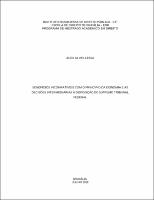Use este identificador para citar ou linkar para este item:
https://repositorio.idp.edu.br//handle/123456789/2455| Título: | Benefícios incompatíveis com o princípio da isonomia e as decisões intermediárias à disposição do Supremo Tribunal Federal |
| Autor(es): | Lessa, Alex Alves |
| Orientador(es): | Victor, Sérgio Antônio Ferreira |
| Palavras-chave: | Legislador negativo;Omissão inconstitucional relativa;Supremo Tribunal Federal;Jurisdição constitucional;Decisões manipulativas |
| Data de submissão: | 2018 |
| Editor: | IDP/EDAP |
| Citação: | LESSA, Alex Alves. Benefícios incompatíveis com o princípio da isonomia e as decisões intermediárias à disposição do Supremo Tribunal Federal. 2018. 182 f. Dissertação (Mestrado em Direito Constitucional) – Instituto Brasiliense de Direito Público, 2018. |
| Resumo: | Este trabalho estuda a omissão inconstitucional relativa, a partir de uma leitura crítica da
teoria do legislador negativo proposta por Kelsen, com abordagem dos instrumentos
decisórios postos à disposição da jurisdição constitucional no Brasil, resultantes da
incorporação de decisões intermediárias pela jurisprudência do Supremo Tribunal Federal e pelas Leis n. 9.868/99 e n. 9.882/99. Busca-se analisar, a partir da tipologia da omissão
inconstitucional, se o modelo do legislador negativo é suficiente para resolver os problemas criados por leis que concedem benefícios incompatíveis com o princípio da isonomia. Tendo como premissa esta classificação, busca-se também compreender as origens, os fundamentos,
os requisitos, as tipologias e os limites das sentenças intermediárias e, em especial, das
sentenças aditivas, com uma análise sobre as práticas decisórias surgidas na Europa e
incorporadas no Brasil pelo STF e pelo legislador, para solucionar os silêncios parciais
violadores da isonomia. Por fim, pretende-se efetivar uma pesquisa das decisões do STF sobre o tema, examinar até que ponto a nossa Corte Constitucional tem proferido sentenças manipulativas e, em especial, sentenças aditivas, e se, a partir do exemplo da súmula vinculante 37, a teoria do legislador negativo é apta para resolver adequadamente o problema da omissão relativa. |
| Abstract: | This paper studies the relative unconstitutional omission, based on a critical reading of Kelsen's proposed negative legislator theory, with an approach to the decision-making instruments made available to the constitutional jurisdiction in Brazil, resulting from the incorporation of interim decisions by the jurisprudence of the Federal Supreme Court and by Laws n. 9.868/99 and n. 9.882/99. It seeks to analyze, from the typology of unconstitutional omission, if the model of the negative legislator is sufficient to solve the problems created by laws that grant benefits incompatible with the principle of isonomy. Based on this classification, it is also sought to understand the origins, the fundamentals, the requirements, the typologies and the limits of the intermediate sentences, and especially the additive sentences, with an analysis of the decision-making practices that have emerged in Europe and incorporated in the Brazil by the STF and by the legislator, to solve the partial silences violating isonomy. Finally, it is intended to carry out a search of the decisions of the STF on the subject, to examine to what extent our Constitutional Court has rendered manipulative sentences, and especially additive sentences, and if, from the example of the binding precedent 37, if negative legislator theory is apt to adequately solve the problem of relative omission |
| URI: | http://dspace.idp.edu.br:8080/xmlui/handle/123456789/2455 |
| Aparece nas coleções: | Mestrado Acadêmico em Direito Constitucional |
Arquivos associados a este item:
| Arquivo | Descrição | Tamanho | Formato | |
|---|---|---|---|---|
| Dissertação_Alex Alves Lessa_DIREITO CONSTITUCIONAL_2018.pdf | 983.42 kB | Adobe PDF |  Visualizar/Abrir |
Os itens no repositório estão protegidos por copyright, com todos os direitos reservados, salvo quando é indicado o contrário.
